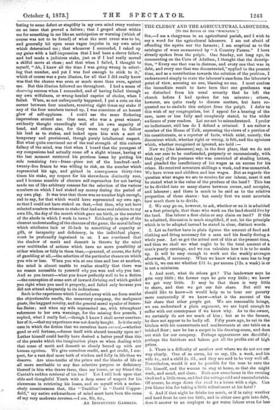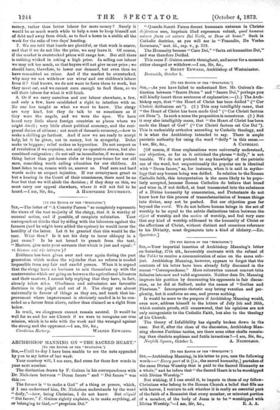THE CLERGY AND THE AGRICULTURAL LABOURERS.
[TO THE EDITOR OF THE "SPECTATOR."]
Ssa,—I am a clergyman in an agricultural pariah, and I wish to say a word for the agricultural labourers. I am not afraid of offending the squire nor the farmers ; I am sceptical as to the catalogue of woes enumerated by "A Country Parson." I have already spoken from the pulpit. One Sunday, not long ago, in commenting on the Cave of Adallam, I thought that the descrip- tion, "Every one that was in distress, and every one that was in debt, and every one that was discontented," applied to the present time, and as a contribution towards the solution of the problem, I endeavoured simply to state the labourer's case from the labourer's point of view, accusing no one, blaming no one. I must confess the immediate result to have been that one gentleman was so disturbed from his usual serenity that he left the church before I had spoken for ten minutes ; others, however, are quite ready to discuss matters, but have re- quested me to exclude this subject from the pulpit. I defer to this wish of my congregation, but I appeal for a hearing of the ease, more or less fully and completely stated, to the wider audience of your readers. Let me not be misunderstood. I prefer no indictment, still less do I defend a criminal. I am rather a member of the House of Talk, expressing the views of a portion of his constitutents, or a reporter of facts, which exist, namely, the discontent which, whether right or wrong, is felt, and the opinions which, whether recognised or ignored, are held :— Now we [the labourers] say, in the first place, that we do not wish our case to be confounded, purposely or unconsciously, with that (say) of the postman who was convicted of stealing letters, and pleaded the insufficiency of his wages as an excuse for his crime. He received seventeen shillings a week, and was unmarried. We have wives and children and less wages. But as regards the question what wages we are to receive for our labour, must it not be stated what is the value of the produce of the land ? This has to be divided into so many shares between owner, and occupier, and labourer ; and there is much to be said as to the relative proportion of those shares : but surely first we must ascertain how much there is to divide.
2. We may go on, however, to ask, whether or no it is admitted as a first principle, that those who work on the land should live by the land. Has labour a first claim or any claim on land? If this be admitted, discussion is much simplified, if not, let the principle which is to be adopted instead be stated in clear, distinct words.
3. Let us further have in plain figures the amount of food and clothing and firing necessary for a man and his family during a whole year. Let us get the actual cost of this at the present time, and then we shall see what ought to be the total amount of a man's yearly earnings, and we can calculate how it is to be made up. It will be easy enough to work out the weekly averages afterwards, if necessary. When we know what a man has to buy with it, we can see whether £31 Is. per annum (12s. a week) is or is not a minimum.
4. And next, what do others get ? The landowner says he gets very little ; the farmer says he gets very little ; we know we get very little. It may be that there is very little to share, and that we get our fair share. But still we should like to know—it would help us to bear our poverty more contentedly if we knew—what is the amount of the fair share that other people get. We are reasonable beings, we can understand a plain argument, we are loyal enough to suffer with our countrymen if we know why. As to the owner, we certainly do not see much of him ; but as to the farmer, he does not appear to be badly off. Fifty years ago, he eat in the kitchen with his manservanM and maidservants at one table on a bricked floor ; now he has a carpet in his drawing-room, and does not wish for our company. Perhaps appearances are .deceitful ; perhaps the butchers and bakers get all the profits out of high prices.
5. There is a difficulty of another sort where we do not see our way clearly. One of us earns, let us say, 12s. a week, and his wife 4s., and a child 2s. Gd., and they are said to be very well off. Nevertheless, would it not be possible for the man to earn the 16s. himself, and the woman to stay at home, so that she might wash, and mend, and clean. Both now come home in the evening tired and a little cross, and find the cottage cold and uncomfortable. Of course, he steps down the road to a house with a sign. Can you blame him for taking a little refreshment at his hotel ?
6. And if that night he drinks too much, or if in rainy weather and hard frost he eats too little, and in either case gets into debt, does it answer to an employer to get worse labour even for leas
money, rather than better labour for more money ? Surely it would be as much worth while to help a man to keep himself out of debt and away from drink, as to feed a horse in a stable all the week for the sake of two days' hunting.
7. We are told that hands are plentiful, or that work is scarce, and that if we do not like the price, we may leave it. Of course, if the market is overstocked prices will range low. But still there is nothing wicked in asking a high price. In selling our labour we may ask too much, so that buyers will not give us our price ; we should have, therefore, to lower our demand, but even then we have committed no crime. And if the market be overstocked, why may we not withdraw our wives' and our children's labour from it ? God knows, we do not want to force them to work, but they must eat, and we cannot earn enough to feed them, so we sell their labour for what it will fetch.
8. Or if we carry ourselves and our labour elsewhere, a few, and only a few, have established a right to interfere with us. No one has taught us what we want to know. The clergy are very kind, but they do talk to us sometimes as if they were the angels, and we were the apes. We have heard very little about foreign countries as places where we might dwell ; very little about political economy, and the reci- procal duties of citizens ; not much of domestic economy,—how to make a shilling go farthest. And if now we are ready to accept help, let it be given, not in money, but in sympathy. Doles make us beggars ; relief makes us hypocrites. Do not suspect us of revolution if we organise, not only co-operative stores, but also combined emigration ; do not call us incendiaries, if we seek some- thing better than pot-house clubs or the poor-house for our old men, something worth calling education for our children. At least listen to us, reason with us, answer us. Deaf ears and hard words make us suspect injustice. If our countrymen grant us but a hearing in the Court of their consciences, there need be no fear but that we will abide the decision ; if they deny us this, we mast carry our appeal elsewhere, where it will not fail to be



































 Previous page
Previous page